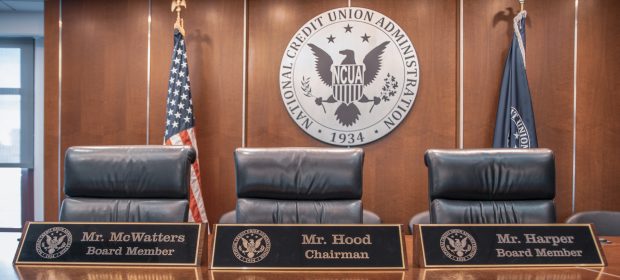 The NCUA Board (Source: NCUA)
The NCUA Board (Source: NCUA)
The NCUA must improve its enforcement of consumer protections at credit unions with less than $10 billion in assets, NCUA Board Member Todd Harper said in speeches over the past two days.
In a speech Tuesday at a meeting of "Women in Housing and Finance Policy" and NAFCU's Congressional Caucus, Harper outlined his regulatory priorities.
Recommended For You
"Although credit unions are owned by their members, management's actions may not always align with the consumers' best interests and the requirements of federal regulations," he said in his housing speech.
Harper said that the agency's current process of examining and enforcing consumer protection laws at credit unions with less than $10 billion is not comparable to its "sister" agencies.
He said those agencies conduct regularly scheduled risk-focused consumer compliance reviews and assign a separate consumer compliance rating outside the CAMEL process.
He added that the NCUA's approach runs counter to the Federal Financial Institutions Examinations Council, which works to prescribe uniform principles for agencies.
The NCUA has focused on safety and soundness, rather than consumer protection, he said.
"This policy may have worked well when the NCUA oversaw a large number of small credit unions serving a limited field of membership with only a few basic financial products, but today's credit unions are larger and more complex," he said.
The agency should strive to better protect consumer interests, he said.
And Harper was critical of the plan to delay the NCUA's Risk-Based Capital rule for an additional two years. Harper voted against the proposal when it was considered by the NCUA board.
"In my view, robust capital cushions are a key component of protecting against financial institutions' failures and losses," he said.
The rule would protect credit unions in case of an economic downturn, Harper said.
Harper said that the failure of federally insured credit unions that concentrated on tax medallion lending demonstrated the need for the RBC rule, adding that other credit unions had to pay for the poor decisions of those institutions.
Harper also made a veiled reference to an executive order that calls for independent agencies to be required to submit their rules to the Office of Management and Budget before they are adopted.
"To guard against political interference that could undermine regulation and supervision," he said, "Congress established us regulators as independent agencies. Accordingly, I believe, we need to protect the agency from outside political interference."
© Touchpoint Markets, All Rights Reserved. Request academic re-use from www.copyright.com. All other uses, submit a request to [email protected]. For more inforrmation visit Asset & Logo Licensing.






